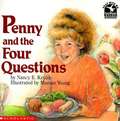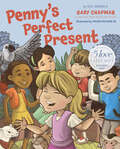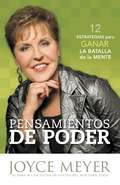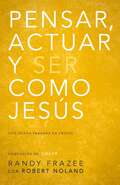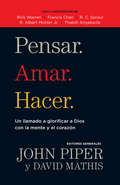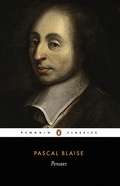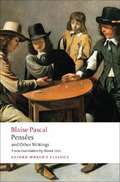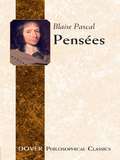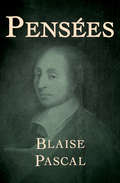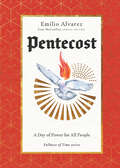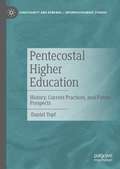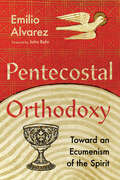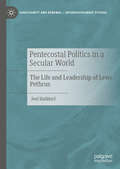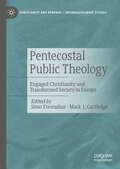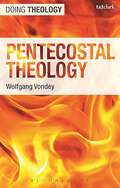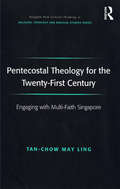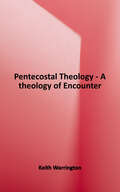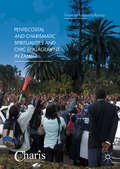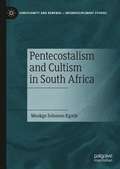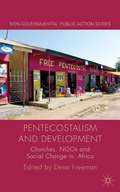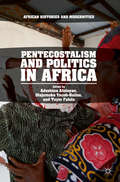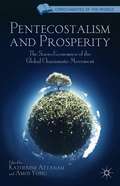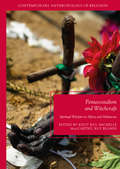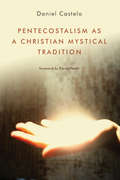- Table View
- List View
Penny And The Four Questions
by Nancy KrulikIt's finally Penny's turn to ask the four questions at the Passover Seder! But now a special guest is coming, and Penny might not get her chance. A special story of friendship-and a little girl who learns the true meaning of Passover.
Penny's Perfect Present
by Gary Chapman Rick OsborneA fun book for kids that teaches the secret to relationships In Penny&’s Perfect Present, Penny struggles to feel loved amid all the hustle and bustle around her. She just wants to spend time with her loved ones, but everyone is so busy. Will the trip mom and dad have planned lift her spirits? Join Penny and her friends as they take a visit to the Pet Pal Emporium, a magical place with exotic animals and exciting exhibits. There the owner, Dr. Chapman, creatively teaches the kids about God&’s ever-present love, plus practical ways to show love to others. With a positive message, fun pictures, and animals for children to search out on the page, Penny&’s Perfect Present is a great tool for parents who want to entertain their children while forming confidence and virtue in them.
Penny's Perfect Present
by Gary Chapman Rick OsborneA fun book for kids that teaches the secret to relationships In Penny&’s Perfect Present, Penny struggles to feel loved amid all the hustle and bustle around her. She just wants to spend time with her loved ones, but everyone is so busy. Will the trip mom and dad have planned lift her spirits? Join Penny and her friends as they take a visit to the Pet Pal Emporium, a magical place with exotic animals and exciting exhibits. There the owner, Dr. Chapman, creatively teaches the kids about God&’s ever-present love, plus practical ways to show love to others. With a positive message, fun pictures, and animals for children to search out on the page, Penny&’s Perfect Present is a great tool for parents who want to entertain their children while forming confidence and virtue in them.
Pensamientos de Poder: 12 Estrategias para Ganar la Batalla de la Mente
by Joyce MeyerJoyce Meyer has a knack for coining phrases-her fans call them Joyceisms-and one of her best loved is "Where the mind goes, the man follows." This was the basis for Battlefield of the Mind, and in her latest book, Meyer provides "power thoughts," bringing the reader to a new level of ability to use the mind as a tool to achievement.In POWER THOUGHTS, she outlines a flexible program to turn thoughts into habits, and habits into success. Sections include: · The Power of a Positive You · 5 Rules for Keeping Your Attitude at the Right Altitude · More Power To You bulleted keys to successful thinking in each chapter · The Power of PerspectiveNobody has more of a "can-do" attitude than Joyce Meyer. Now you can, too.
Pensar, actuar, ser como Jesús: Llegar a ser una nueva persona en Cristo
by Randy Frazee Robert NolandLa Biblia nos enseña que la meta de la vida cristiana es llegar a ser semejantes a Jesús, tanto por nuestro propio crecimiento persona, como por el bien de los demás. La visión de Dios en cuanto a nuestra vida va más allá de nosotros mismos, porque es una visión de comunidad; de vivir juntos. Esto significa que la necesidad de asemejarnos a Jesús se halla íntimamente relacionada con nuestra manera de pensar, con nuestra forma de actuar hacia los demás y en última instancia, con el tipo de persona en el que nos estamos convirtiendo. Para comenzar este camino, necesitas captar la visión y saber hacia dónde se dirigen tus pasos. En este libro, el pastor y autor Randy Frazee te ayudará a desarrollar una visión personal de tu crecimiento espiritual, y un sencillo plan para dar los primeros pasos. Después de presentar la historia de la Biblia y mostrar dónde se ubica nuestra vida en el cuadro general de lo que Dios está haciendo en el mundo, Frazee nos ayuda a identificar diez creencias básicas, diez prácticas básicas y diez virtudes básicas que nos ayudarán a pensar como Jesucristo, actuar como Él y asemejarnos más a Él. Identifica también algunas de las barreras y de las trampas que nos impiden crecer, destacando la necesidad que tenemos de tomar deliberadamente la decisión de caminar en la gracia, usando los medios que Dios nos da gratuitamente para que crezcamos y nos fortalezcamos en nuestra fe.
Pensar. Amar. Hacer.: Un llamado a glorificar a Dios con la mente y el corazón
by John Piper David MathisAquí, hay un llamado al cristianismo holístico: un reto a ser pensadores comprometidos y serios respecto a conocer a Dios, a ser sentidores que laten con pasión por Jesús y su evangelio, y ser hacedores que se esfuerzan por hacer grandes actos de amor por otros. Nuestro Salvador mismo nos muestra que el cristianismo holístico se compone de mente, corazón y manos. Él nos enseña también que la vida cristiana es multidimensional: pensar, amar y hacer son conceptos que no se pueden reducir ni separar. Con las colaboraciones de Francis Chan, Rick Warren, Albert Mohler, R. C. Sproul y Thabiti Anyabwile, Pensar. Amar. Hacer extiende una invitación profunda y convincente a experimentar la plenitud de la vida cristiana. Here is a call to holistic Christianity: A challenge to be thinkers, engaged and serious about knowing God. And to be feelers, pulsing with passion for Jesus and his gospel. And to be doers, endeavoring great acts of love for others. Our Savior himself shows us that holistic Christianity is comprised of mind, heart, and hands. And he shows us that the Christian life is multidimensional--irreducibly and inseparably thinking, loving, and doing. With contributions from Francis Chan, Rick Warren, Albert Mohler, R. C. Sproul, and Thabiti Anyabwile, Thinking. Loving. Doing. extends a thorough and compelling invitation to experience the fullness of the Christian life.
Pensees
by Blaise PascalA passionate defence of religious faith by the great seventeenth-century philosopher, mathematician and physicistBlaise Pascal was the precociously brilliant contemporary of Descartes, but it is his unfinished apologia for the Christian religion upon which his reputation now rests. The Pensées is a collection of philosophical fragments, notes and essays in which he explores the contradictions of human nature in psychological, social, metaphysical and, above all, theological terms. Humankind emerges from Pascal's analysis as a wretched and desolate creature within an impersonal universe, but also as a being whose existence can be transformed through faith in God's grace.Translated with an Introduction by A. J. Krailsheimer
Pensees and Other Writings (Oxford World's Classics)
by Blaise PascalThese were to become known as the Pensees, and they occupy a crucial place in Western philosophy and religious writing. Pascal's general intention was to confound scepticism about metaphysical questions. Some of the Pensees are fully developed literary reflections on the human condition,, some contradict others, and some remain jottings whose meaning will never be clear.
Pensées
by Blaise Pascal"Men despise religion. They hate it and are afraid it may be true," declared Pascal in his Penseés. "The cure for this," he explained, "is first to show that religion is not contrary to reason, but worthy of reverence and respect. Next make it attractive, make good men wish it were true, and then show that it is." Motivated by the 17th-century view of the supremacy of human reason, Pascal (1623-1662) intended to write an ambitious apologia for Christianity, in which he argued the inability of reason to address metaphysical problems. While Pascal's untimely death prevented his completion of the work, these fragments published posthumously in 1670 as Penseés remain a vital part of religious and philosophical literature. Introduction by T. S. Eliot.
Pensées
by Blaise PascalThe seventeenth-century philosopher and mathematician&’s influential treatise in support of religion. Blaise Pascal was not a gambler, but he posited one of the most famous wagers of all time: Every man&’s life is a bet against God. It is a wager that any man can win, however. Sacrifice earthly pleasures—drink, lust, sin, etc.—and a lifetime of happiness awaits, in this world or the next. Live every day as if God exists, and you can&’t lose. Pascal devised his wager in the seventeenth century, but the lessons written by this brilliant man ring true today. In this collection of fragments intended as a defense of Christianity, everything is up for debate. From the nature of love to the relationship between scientific inquiry and religious faith, Pascal shows that skepticism and devotion go hand in hand.
Pentecost: A Day of Power for All People (The Fullness of Time #Volume Six)
by Emilio Alvarez"The power of Pentecost is inseparable from the good news of the Christ who is proclaimed in the Gospels, in accordance with the Scriptures." Pentecost may well be the most misconstrued day on the church calendar. A long legacy of cessationism has drained Pentecost of much of its significance, and it's largely misunderstood in many Western churches today, if not outright ignored. That's not the case in Emilio Alvarez's tradition, though. In this Fullness of Time volume, the Pentecostal bishop and theologian offers us a rich biblical and theological introduction to the day of Pentecost and sets it in its liturgical context—not only in the Protestant tradition but also in Catholic, Orthodox, and Pentecostal expressions. The result is a rich theological feast and an invitation to find afresh the power of the gospel for all peoples. Each volume in the Fullness of Time series invites readers to engage with the riches of the church year, exploring the traditions, prayers, Scriptures, and rituals of the seasons of the church calendar.
Pentecostal Higher Education: History, Current Practices, and Future Prospects (Christianity and Renewal - Interdisciplinary Studies)
by Daniel TopfThis book presents a theological and missiological argument for pentecostals to engage more forcefully in higher education by expanding and renewing their commitment toward operating their own colleges and universities. The volume’s first part describes past and present developments within higher education, highlighting strengths and weaknesses of both pentecostal and (post)secular institutions. The second part highlights the future potential of pentecostal higher education, which is enriched by a Spirit-empowered and mission-minded spirituality that focuses on forming the hearts, heads, and hands of students. Pentecostals increasingly desire to influence all spheres of society, an endeavor that could be amplified through a strengthened engagement in higher education, particularly one that encompasses a variety of institutions, including a pentecostal research university. In developing such an argument, this research is both comprehensive and compelling, inviting pentecostals to make a missional difference in the knowledge-based economies that will characterize the twenty-first century.
Pentecostal Orthodoxy: Toward an Ecumenism of the Spirit
by Emilio Alvarez“Can anything orthodox come from Pentecostalism?”This recasting of Nathaniel's familiar question from the Gospel is a fair summary of many modern Christians' assessment of the Pentecostal tradition. Yet in recent years, a growing number of Pentecostals have been turning afresh to the ancient, creedal Christian faith.Pentecostal Orthodoxy
Pentecostal Politics in a Secular World: The Life and Leadership of Lewi Pethrus (Christianity and Renewal - Interdisciplinary Studies)
by Joel HalldorfThis book investigates the life and leadership of Lewi Pethrus, a monumental figure in Swedish and international Pentecostalism. Joel Halldorf describes Pethrus’ role in the emergence of Pentecostalism in Sweden, the ideals and practices of Swedish Pentecostalism, and the movement’s turn to professional party politics. When Pentecostals in the USA ventured into politics, they became allied with the Republican party, and later Donald Trump. The Swedish Pentecostals took another route: while culturally conservative, they embraced the progressive economic politics of the Social Democratic party. During the 2010s, they have also rejected the nationalism of the growing populist movement. Halldorf analyzes and explains these differences between Swedish evangelicals and Pentecostals on the one hand, and the Religious Right in the USA on the other.
Pentecostal Public Theology: Engaged Christianity and Transformed Society in Europe (Christianity and Renewal - Interdisciplinary Studies)
by Mark J. Cartledge Simo FrestadiusThis is the first academic work to focus explicitly on Pentecostal public theology in Europe. Following a growing interest in understanding Pentecostal beliefs and practices with respect to the public sphere, this book shifts the focus of Pentecostal engagement with politics, society, and culture from the Global South and North America to Europe. This work also discusses themes such as Pentecostal public values, identity, nationalism, poverty, democracy, education, race, and political engagement in the context of European Pentecostalism. The book provides an historical overview by bringing together various European voices to discuss the current challenges and possible trajectories for Pentecostal public theology in a constructive fashion. With contributions from leading and emerging European Pentecostal and Charismatic scholars, this book is a must for scholars interested in understanding Pentecostal beliefs and practices in the public sphere in a European context.
Pentecostal Theology
by Wolfgang VondeyPentecostalism is the most rapidly growing branch of Christianity since the 20th century, yet it does not lend itself well to a singular doctrine and there is, therefore, no single comprehensive account of Pentecostal theology worldwide. Wolfgang Vondey suggests an account of Pentecostal theology that is genuine to Pentecostals worldwide while allowing for different adaptation and explication among the various Pentecostal groups. He argues that Pentecostal theology is fundamentally concerned with the renewal of the Christian life identified by the transforming work of the Holy Spirit and directed toward the kingdom of God. <P><P> The book unfolds in two main parts illustrating the full gospel story and theology. Eleven chapters identify the spiritual underpinnings and motivations for Pentecostal theology, formulate a Pentecostal theology of action, translate, apply, and exemplify Pentecostal practices and experiences, and integrate Pentecostal theology in the wider Christian tradition.
Pentecostal Theology for the Twenty-First Century: Engaging with Multi-Faith Singapore (Routledge New Critical Thinking in Religion, Theology and Biblical Studies)
by May Ling Tan-ChowIn our post 9/11 world where there is a growing religious fundamentalism, and when both exclusion and easy tolerance are inadequate options, this book offers a creative alternative arguing that Pentecostalism has the potential to be a peaceful harbinger of plurality. The potential lies in its spirituality - a lively pneumatology and eschatology. The eschatological Spirit is seen as orientated towards the other, crossing boundaries in redemptive embrace, transcending exclusion and easy tolerance. This book's non-Western perspective and the empirical contextual study of Singapore's multicultural and multi-faith context are unique contributions to religion and society. This is a book for students, pastors, teachers, and theologians concerned for an approach to mission that is sensitive to their context, who want to learn from a creative theological voice from what has been perhaps the largest religious movement in history, and who see the immense potential in lively theology by Christians of the Chinese diaspora who can speak to the many millions of ethnic Chinese Christians. This book will also appeal to those outside Christianity who are interested in its attempts to engage with a complex multi-ethnic and multi-religious situation such as that in Singapore.
Pentecostal Theology: A Theology of Encounter
by Keith WarringtonPentecostals (traditionally) do not think theologically so much as do it practically. This book will present Pentecostal theology as well as the particular style of Pentecostal thinking and praxis that makes it different. Pentecostalism is not just distinctive because of its belief base but also because of the worldview it owns. The latter is based on the certainty that a religion that does not work is not worth much. Consequently, they look for expressions of life and vitality in their faith. These dominate, rather than an expression of the cerebral, though this is changing. Nevertheless, the sense of the immediate, the God of the now not the distant past, underlie how they do theology. Pentecostal theology tends to be seen through the eyes of people, not theologians; through the community, not traditions (though they have them); through their faith and worship, not ancient creeds. It is a theology of the dynamic, seen through the lens of experience. It is a functional theology that exists to operate; to incorporate an experiential dimension. Pentecostal theology does not operate like other theologies which often only detail a list of beliefs; it does this but also and (more) importantly, it explores them in the context of praxis. Thus, this volume incorporates praxis as part of the inquiry relating to theology.
Pentecostal and Charismatic Spiritualities and Civic Engagement in Zambia (Christianity and Renewal - Interdisciplinary Studies)
by Naar M’fundisi-HollowayFor the past sixty years, the Pentecostal and Charismatic movement has played a major role in Zambia. In this book, Naar Mfundisi-Holloway explains the history of this development and its impact on civic engagement. She opens a discussion on church-state relations and explains how the church presented a channel of hope in the wake of the HIV/AIDS pandemic, despite having a history that eschewed civic engagement. In fact, the pandemic propelled the church to work alongside the state in the fight against the disease. Using interviews and historical analysis, this book provides valuable insight into how Pentecostal and Charismatic churches have effectively engaged matters of civic concern in Zambia dating from colonial times.
Pentecostalism and Cultism in South Africa (Christianity and Renewal - Interdisciplinary Studies)
by Mookgo Solomon KgatlePentecostalism is a growing movement in world Christianity. However, the growth of Pentecostalism in South Africa has faced some challenges, including the abuse of religion by some prophets. This book first names these prophets and the churches they lead in South Africa, and then makes use of literary and media analysis to analyse the religious practices by the prophets in relation to cultism. Additionally, the book analyses the “celebrity cult” and how it helps promote the prophets in South Africa. The purpose of this book is threefold: First, to draw parallels between the abuse of religion and cultism. Second, to illustrate that it is cultic tendencies, including the celebrity cult, that has given rise to many prophets in South Africa. Last, to showcase that the challenge for many of these prophets is that the Pentecostal tradition is actually anti-cultism, and thus there is a need for them to rethink their cultic tendencies in order for them to be truly relevant in a South African context.
Pentecostalism and Development
by Dena FreemanDevelopment was founded on the belief that religion was not important to development processes. The contributors call this assumption into question and explore the practical impacts of religion by looking at the developmental consequences of Pentecostal Christianity in Africa, and by contrasting Pentecostal and secular models of change.
Pentecostalism and Politics in Africa (African Histories and Modernities)
by Toyin Falola Adeshina Afolayan Olajumoke Yacob-HalisoAs the epicenter of Christianity has shifted towards Africa in recent decades, Pentecostalism has emerged as a particularly vibrant presence on the continent. This collection of essays offers a groundbreaking study of the complex links between politics and African Pentecostalism. Situated at the intersection between the political, the postcolonial, and global neoliberal capitalism, contributors examine the roots of the Pentecostal movement’s extraordinary growth; how Pentecostalism intervenes in key social and political issues, such as citizenship, party politics, development challenges, and identity; and conversely, how politics in Africa modulate the Pentecostal movement. Pentecostalism and Politics in Africa offers a wide-ranging picture of a central dimension of postcolonial African life, opening up new directions for future research.
Pentecostalism and Prosperity
by Amos Yong Katherine AttanasiWhile there are a growing number of researchers who are exploring the political and social aspects of the global Renewal movement, few have provided sustained socio-economic analyses of this phenomenon. The editors and contributors to this volume offer perspectivesin light of the growth of the Renewal movement in the two-thirds world.
Pentecostalism and Witchcraft
by Ruy Blanes Knut Rio Michelle MaccarthyThis open access book presents fresh ethnographic work from the regions of Africa and Melanesia--where the popularity of charismatic Christianity can be linked to a revival and transformation of witchcraft. The volume demonstrates how the Holy Spirit has become an adversary to the reconfirmed presence of witches, demons, and sorcerers as manifestations of evil. We learn how this is articulated in spiritual warfare, in crusades, and in healing or witch-killing raids. The contributors highlight what happens to phenomena that people address as locally specific witchcraft or sorcery when re-molded within the universalist Pentecostal demonology, vocabulary, and confrontational methodology.
Pentecostalism as a Christian Mystical Tradition
by Daniel Castelo Elaine HeathInformed reassessment of Pentecostalism as a mystical tradition of the church universal Pentecostalism, says Daniel Castelo, is commonly framed as "evangelicalism with tongues" or dismissed as simply a revivalist movement. In this book Castelo argues that Pentecostalism is actually best understood as a Christian mystical tradition. Taking a theological approach to Pentecostalism, Castelo looks particularly at the movement's methodology and epistemology as he carefully distinguishes it from American evangelicalism. Castelo displays the continuity between Pentecostalism and ancient church tradition, creating a unified narrative of Pentecostalism and the mystical tradition of Christianity throughout history and today. Finally, he uses a test case to press the question of what the interactions between mystical theology and dogmatics could look like.
